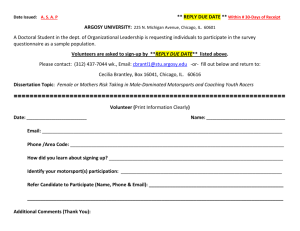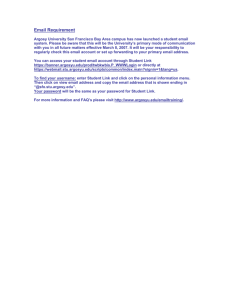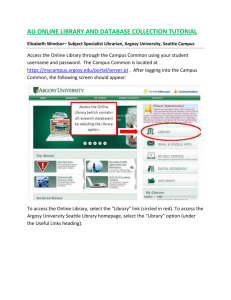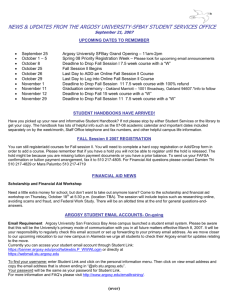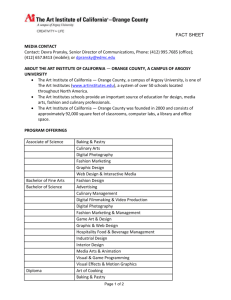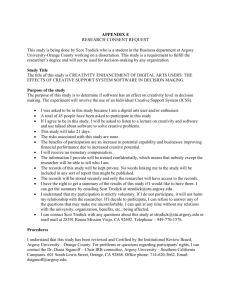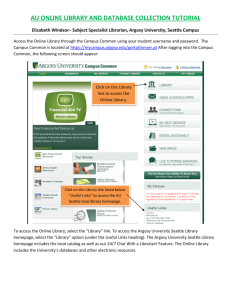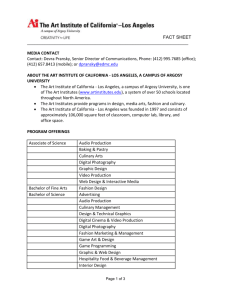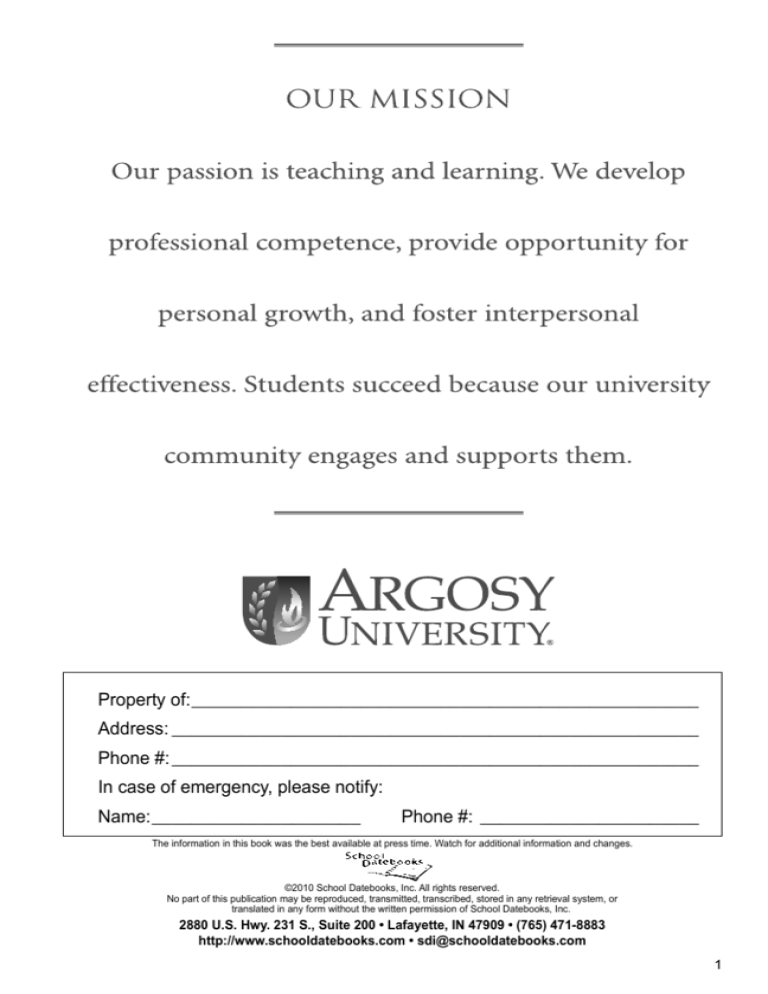
Property of:____________________________________________________
Address:______________________________________________________
Phone #:______________________________________________________
In case of emergency, please notify:
Name:______________________ Phone #:_______________________
The information in this book was the best available at press time. Watch for additional information and changes.
©2010 School Datebooks, Inc. All rights reserved.
No part of this publication may be reproduced, transmitted, transcribed, stored in any retrieval system, or
translated in any form without the written permission of School Datebooks, Inc.
2880 U.S. Hwy. 231 S., Suite 200 • Lafayette, IN 47909 • (765) 471-8883
http://www.schooldatebooks.com • sdi@schooldatebooks.com
1
Table of Contents
Section One....................................................3
Introduction.......................................................... 3
About This Handbook......................................... 3
Welcome From the Campus President.............. 3
Right to Change Requirements........................... 3
Section Two....................................................4
Campus Information............................................ 4
Campus Facilities.................................................. 4
Campus Organization.......................................... 4
Building & Office Hours..................................... 4
Academic Services/Advising............................... 5
Websites & Publications...................................... 5
Argosy University Student Portal....................... 5
Argosy University Distance Learning.
Information for Students................................ 6
Emergency Procedures & Closings.................... 7
Fires........................................................................ 7
Emergency Evacuation........................................ 7
Police...................................................................... 7
Building Security.................................................. 7
Theft....................................................................... 7
Accidents and Illness............................................ 7
Incident Reports................................................... 7
School Closings..................................................... 8
ID’s/Access Cards................................................. 8
Portable Communication Devices..................... 8
Student Messages.................................................. 8
Section Three..................................................9
Library Services, Computer Lab and
Text Books........................................................ 9
Library Services.................................................... 9
Computer Lab....................................................... 9
Textbook & Course Materials Purchasing........ 9
Section Four.................................................10
Student Services and Resources.......................10
Registration.........................................................10
Registration Deadlines and Dates....................10
Course Transfers and Waivers..........................11
Courses Taken at Other Argosy
University Campuses.....................................11
Student Finance..................................................11
Disabilities...........................................................11
Counseling Services...........................................12
Transcript Requests............................................12
Information Changes.........................................12
Release of Information.......................................12
2
Student Health Insurance..................................12
Student Evaluations and Surveys......................12
Graduation..........................................................12
Petition to Graduate...........................................12
Diplomas.............................................................12
Commencement.................................................12
Section Five...................................................13
Health/Safety Policies and Procedures............13
Campus Security Report &
Crime Statistics..............................................13
Drug Free Workplace & Campus.....................13
Effects of Drugs and Alcohol............................13
Health Risks Associated with the
Use of Alcohol................................................13
Health Risks Associated with the
Use of Drugs...................................................14
Sanctions..............................................................15
Danger Signals Indicating a Drug or
Alcohol Problem............................................18
Counseling, Treatment, or
Rehabilitation Program.................................18
Sexual Assault and Sexual Offenses.
Procedures and Prevention..........................19
Education Programs...........................................19
Information Regarding Registered
Sex Offenders.................................................19
Counseling and Student Services.....................19
Campus Disciplinary Actions...........................20
Sanctions..............................................................20
Appendix I....................................................21
Faculty Listings...................................................21
College of Business.............................................21
College of Education..........................................21
College of Psychology and Behavioral.
Sciences...........................................................21
College of Undergraduate Studies....................23
Appendix II...................................................25
Campus Directory..............................................25
Administration...................................................25
Academics...........................................................25
Admissions..........................................................26
Student Services..................................................26
Student Finance..................................................26
Appendix III.................................................27
Academic and Holiday Calendar.....................27
Section One
introduction
ABOUT THIS HANDBOOK
Your Argosy University, Salt Lake City Student Handbook is a valuable resource as you progress
through your academic program. The handbook makes it easy to know where to go for
resources and information, and includes policies and procedures that are important for you
to read and understand. This handbook can serve as a guide for campus specific information.
The Argosy University, Salt Lake City Student Handbook incorporates by reference the Argosy
University 2010-2011 Academic Catalog. Regulations and procedures found in these documents
are considered to be a part of this handbook. Make sure to reference your academic catalog.
WELCOME From The Campus President
It is a pleasure to welcome you to the educational community of Argosy University, Salt Lake
City. We are pleased that you have selected Argosy University, Salt Lake City for pursuit of
your educational goals and hope you will enjoy the challenge and expectations that lie before
you as you achieve the “Human Side of Success!”
The Argosy University, Salt Lake City Handbook includes campus policies and procedures
to assist you in navigating the academic and administrative issues and obligations necessary
for you to pursue your educational goals. To further assist you, Argosy University, Salt Lake
City employs on outstanding faculty to deliver quality curriculum which will offer you the
skills, knowledge, and capabilities necessary for professional careers in education, business
and behavioral sciences.
At Argosy University, Salt Lake City we believe in people and the relationships we build together. We are passionate about the importance of education and believe that we must continually
improve ourselves through professional development as we continue to improve and add value
to the communities in which we live. I look forward to your achievements at Argosy University,
Salt Lake City and want you to be proud of your accomplishments here. I believe that as we
strive for perfection together, “Excellence will be our Standard.” Our very best wishes to you
as you pursue your education and career goals. Julie Johnson, MBA
Campus President
Argosy University, Salt Lake City
Right to change requirements
Argosy University, Salt Lake City reserves the right to change the policies contained within this
student handbook from time to time. Accordingly, although notice is not required for a new
policy to take effect, Argosy University, Salt Lake City will make reasonable attempts to notify
students promptly of any policy changes through web site or email postings, mail distributions
or other methods deemed appropriate by the University administration. Students are responsible
for making themselves aware of any changes.
3
Section Two
Campus information
CAMPUS FACILITIES
Argosy University, Salt Lake City is located at 121 Election Rd., Suite 300, Draper, Utah.
Main Phone Number: 801.601.5000
Toll Free: 888.639.4756
Fax: 801.601.4990
Classrooms
Most classrooms are equipped with white boards, computers, projectors, dvd players and wi-fi
access. Please contact the receptionist if you experience any difficulties when trying to operate
any of the classroom equipment.
Student Breakroom/Vending
A breakroom, which includes vending machines, filtered water, coffee pot, refrigerators and a
microwave, is located on the 3rd floor in the classroom area. CAMPUS ORGANIZATION
The campus is organized into the following administrative departments: Admissions, Student
Services, Student Finance, Academic Program Departments, Contact information is in the
sections on Building Administration Contact Information and Academic Services/Advising.
BUILDING & OFFICE HOURS
The main offices of Argosy University, Salt Lake City are open from 8:30 am to 6:00 pm Monday’s
and 8:30 am to 7:00 pm Tuesday through Friday.
Student Services 9:00 am – 5:00 pm Monday’s and 9:00 am to 6 pm Tuesday through Friday
or by appointment.
Student Finance: 9:00 am – 5:00 pm Monday’s and 9:00 am to 6 pm Tuesday through Friday
or by appointment.
Resource Access Center (RAC): 8:00 am to 10:00pm Monday through Saturday
Administration Contact Information
Campus President
801.601.4915
Julie Johnson
Director of Admissions
Todd Harrison
801.601.4951
Director of Student Services
Wendy Winder
801.601.4917
Program Chair, Marriage & Family Therapy
Dr. Elizabeth Fawcett
801.601.4970
Program Chair, Counselor Education
Dr. Penny Dahlen
801.601.4971
Program Chair, Education
Dr. Vana Nespor
801.601.4916
Program Chair, Undergraduate Studies
Darin Eckton
801.601.4907
Vice President of Academic Affairs
Dr. Vana Nespor
801.601.4916
4
ACADEMIC SERVICES/ADVISING
Upon admission to a program, each new student is assigned an academic advisor who will guide
the student in the selection of courses and general academic matters. Student advising is an
important part of the academic programs at Argosy University, Salt Lake City. In the event that
a student and the academic advisor are unable to develop a harmonious working relationship,
a student may request a new academic advisor upon written request in a letter directed to the
program chair or a designee. If the program chair or a designee is the advisor for whom the
student seeks replacement, the written request should be directed to the campus vice president
of Academic Affairs or designee. Please note that all Student Services forms, such as add/drop
forms & temporary withdrawal forms, must be approved by the student’s academic advisor
before they will be processed by the Registrar. It is preferable that the student contact their
academic advisor for advising before sending in their completed form(s). WEBSITES & PUBLICATIONS
ARGOSY UNIVERSITY STUDENT PORTAL
The Argosy University Student Portal can be used to view your academic record, register for
classes, pay your tuition, check your financial aid status and check your Argosy University email.
• Go to www.argosy.edu.
• Click on Student Link.
• Click on Enter Secure Area. Log on to Argosy University Student Portal using your
username and your password. For first time users, please click on the link for New Students
to create your account. You will be prompted through a series of screens to setup your
login information and security questions. Once you have completed the setup you will be
redirected to login to the Student Portal with your newly created login information.
• To view your academic record, register for classes, pay your tuition, and check your financial
aid status click on the link for My Self Service.
• While in the My Self Service area, make sure to click on the link My Profile, then My
Information. Under the link for My Information you will be able to view your Argosy
University email address.
To Access your Argosy University email account while you are in the Student Portal*:
All University correspondence will be sent to your Argosy University email account.
• From the Main Page, click on Student Email, Click here to sign on.
• A new webpage will open directly connecting you to your email inbox.
• Note: If your mailbox is full you will not be able to receive email.
• To forward your Argosy University email to another email account, click on Email Forwarding Manager on the left hand side of the inbox.
5
Argosy University Distance Learning Information for Students
Online Learning
Platform
Argosy University uses the eCollege platform for online and blended
courses. Some face-to-face courses may also use eCollege to share
information electronically.
1. Go to the Argosy Student Portal at http://mycampus.argosy.
edu and enter your Student Portal login and password; click
the Login button.
2. On the portal homepage, look for the My Classes section on the
right side of the screen.
Click the course title link to access
your online classroom directly
Accessing
eCollege through
the Argosy
University Student
Portal
or
Click the red “Go to my
classes” button locate
your courses in the
eCollege Course List.
Click the blue title link
to enter the course.
You will have access to your courses 3-days before the first day
of a session.
6
eCollege
Technical
Requirements
1. Go to http://myeclassonline.com; click “NO” on the pop up window
2. Click “Technical Requirements”; click “NO” on the pop up window
eCollege Student
Orientation Course
It is highly recommended that you complete an eCollege tutorial
before starting courses. To access the tutorial, click on the red “Go
to my classes” button in the student portal 2 weeks before the session
starts. This orientation course will remain in your account until
you complete your program.
Participation
You must login and participate in their eCollege course on a weekly
basis. Please see your course syllabus for additional information.
Textbooks
If your course is using an eBook, the link to your book will be
available in your eCollege course.
If your course is using a printed textbook, your book will be available
at the MBS Direct online bookstore: http://direct.mbsbooks.com/
argosy.htm
Online Classroom
Support
o Contact the Student Technical Help Desk for support using
the Student Portal, online eCollege classroom, Argosy Digital
Bookshelf and eBooks, or student email at 1.866.4ARGOSY
(1.866.427.4679)
o Contact your instructor for questions about course requirements.
o Contact your campus if you believe you are enrolled in the wrong
class or section.
EMERGENCY PROCEDURES & CLOSINGS
Fires
All students are urged to acquaint themselves with the building evacuation plan that is displayed
throughout the campus, as well as the location of the exits, fire alarm switches, and the available
fire extinguishers located at the end of each hallway and in the breakroom of the campus. In
case of fire, call the emergency operator (911) immediately. Give the operator the precise
location of the fire, and he/she will alert the fire department. If you are dialing from a campus
based phone you must dial 9-911. Emergency Evacuation
When the fire alarm sounds, or under direction from a member of the Argosy University, Salt
Lake City administration, students should go to the closest exit or stairway. In case of emergency
evacuation at Argosy University, Salt Lake City, physically challenged students should move
to a stairwell for evacuation by fire department staff, as stairwells are safer environments.
Elevators should not be used.
Police
To summon the police, call 911 and the operator will alert the police department. If you are
dialing from a campus based phone you must dial 9-911. Building Security
After hours, the campus is protected with locked security doors and devices including cameras.
Students may access the building during the approved hours with the use of their security badge. Proper procedures are followed to ensure limited access to secured areas.
Theft
If a theft has taken place, please report it as soon as possible to the receptionist 801.601.5000,
or the Director of Student Services 801.601.4917. Accidents and Illness
When there is doubt as to procedure in case of medical emergency, immediate medical advice
should be secured by dialing 911. If you are dialing from a campus based phone you must
dial 9-911. Anyone who is injured or becomes ill at the school should be directed to or taken to an
emergency room. If the injury/illness is so serious that the individual cannot be moved, 911
should be called. Instructions concerning first aid and provisions for securing a physician and
an ambulance are handled most efficiently by the procedure described above.
Incident Reports
A complete report of every incident, no matter how minor, should be made to the director of
Student Services 801.601.4917 within 48 hours. The following information will be required:
time and place of accident, how accident occurred, names and addresses of persons involved/
injured, description of the injuries, property damage (if any) to the person(s) and/or school, and
names and addresses of witnesses. Any accident involving serious injury should be reported at
any time during the day or night. These reports will be given immediate attention. In instances
where there is doubt as to whether the accident is serious enough to require a report, it is better
to report it immediately.
7
School Closings
In the event of threatening weather, the campus may be closed by the campus president
or designee. Notification via television reports is made on TV channels, Channel 2 ABC
Snowtracker and Channel 5 CBS SnowWatch and on KSL Radio 1160am and 102.7fm. Students
and employees can also call the school’s main phone at 801.601.5000.
ID’s/ACCESS CARDS
All students and employees at Argosy University, Salt Lake City are required to have a Student
ID/Access Card to enter the building. To obtain an access card, please see the Receptionist at
the front desk.
PORTABLE COMMUNICATION DEVICES
Students are asked to turn off all cell phones while attending class.
STUDENT MESSAGES
All important announcements will be communicated to students via their Argosy University
student email account.
8
Section three
Library Services, Computer LAb and Text Books
Library Services
The Argosy University, Salt Lake City Library supports learning and encourages intellectual
curiosity among students and faculty. All Argosy University, Salt Lake City students have access
to the Argosy University Library through the student portal. Once in the portal, the user is
fully authenticated to use all the library resources and tools. The Argosy University Library is
available for use 24 hours a day, 7 days a week.
Resources
The library provides students with access to books, articles and other scholarly materials. Argosy University, Salt Lake City students have access to over 150,000 books through Argosy
University’s book collection, eBrary and NetLibrary. Physical books can be retrieved through
interlibrary loan. eBrary and NetLibrary book are available in full-text online.
The library also provides access to scholarly databases including the American Psychological
Association’s PsycINFO and PsycARTICLES, as well as various education, business and liberal
arts databases from EBSCO, ProQuest and other vendors.
Argosy University, Salt Lake City students can also use Refworks, an online research management, writing and collaboration tool, to help manage, store and share all types of information
located through the Argosy University library, as well as generate citations and bibliographies.
Self-Guided Help
LibGuides (http://argosy.campusguides.com/) is a collection of online pathfinders that help
answer Argosy University, Salt Lake City-specific library questions. Argosy University library tutorials are also available through the portal library website.
Library Help
Argosy University, Salt Lake City students can call 1.866.4ARGOSY to be connected with library
information 8am-10pm (Eastern), Monday through Saturday. Librarian Instruction
Librarians lead instruction sessions and workshops are available to students on-campus and
online. Library instructions are often held within courses, ranging from undergraduate to
doctoral level, always teaching to the ACRL Information Literacy Competency Standards for
Higher Education. Librarians work with students and faculty to ensure that every Argosy
University, Salt Lake City student has the information skills necessary to identify, evaluate, and
use information ethically and effectively to support academic excellence and lifelong learning. COMPUTER LAB
There are student computers based on the Windows platforms, with a continuous T1 connection
to the Internet, located in the Resource Access Center (RAC). Additionally, there is a printer
and copier for student use. Wi-Fi is also available on campus for student use.
TEXTBOOK & COURSE MATERIALS PURCHASING
Textbooks are available from MBS Direct Textbook and Materials. The toll free number for
MBS is 1.800.325.3252. The toll free fax number is 800.499.0143. Their web site is located at
www.mbsdirect.net. Students may also purchase their materials through other vendors.
Electronic Books
Some programs will utilize an electronic book(s). Once registered for a course, students will
gain access to their electronic book three days prior to the course start and through the online
platform. Students will also have the option to purchase a hard copy of the textbook through
a third party at their own expense.
9
Section Four
Student Services and Resources
REGISTRATION
Argosy University, Salt Lake City students are pre-registered for their courses. If you would like
to customize your schedule please contact your Academic Advisor to schedule an appointment.
REGISTRATION DEADLINES AND DATES
In order to provide flexibility of registration options, there are several registration deadlines
and dates which vary depending upon the student’s payment method, status and program.
1. Payment Deadlines:
a. Financial aid students must have a complete and approved financial aid application prior
to the registration period. If financial aid does not cover the total tuition and fees for
the registration period, students must provide an additional payment method through
the Payment Arrangement Form.
b. Students not receiving financial aid must provide a Payment Arrangement Form with
a valid form of payment during registration. Students will have to provide a credit card
number to register without financial aid.
2. Late Registration:
Students are assessed a $50 late registration fee if they register during the late registration
period. 3. Registration changes:
Students may change their registration during the registration period. After registration is
over, students must complete an Add/Drop Form and submit it to the registrar. Students
who make changes to their schedule after the start of the term will need the signature of
their program chair to add a class. There is a $50 fee for dropping a class after the start of
the term. The Add/Drop Form and the Academic Catalog outline the impact of adding and
dropping classes on students’ grades, financial aid, international status, and VA benefits.
4. Course Availability/Cancellation:
While Argosy University, Salt Lake City makes every effort to provide sufficient course
sections for students,
Argosy University, Salt Lake City reserves the right to cancel any course. Students enrolled
in canceled courses will be granted a full refund and will be allowed to add a course.
Enrollment in a particular course section or with a specific instructor is not guaranteed.
Course instructors may change at the discretion of Argosy University, Salt Lake City.
5. Payment Deadlines:
Students are subject to payment deadlines as outlined in the Academic Catalog. These
policies require students to be paid in full prior to registration. A payment plan or approved
financial aid application must be on file prior to registration.
6. Holds:
Students must clear all holds on their account prior to registering. Holds may be placed
on student accounts for incomplete registration, incomplete admissions or financial
documentation, balances on their accounts from previous terms, incomplete financial aid,
and library materials not returned. Students must contact the appropriate department to
clear a hold on their account.
10
COURSE TRANSFERS AND WAIVERS
Graduate Transfer Credits
Graduate transfer credit criteria are outlined in the Argosy University Academic Catalog. In
order to have credits evaluated for transfer to a graduate level program at Argosy University,
Salt Lake City the following steps will be followed:
1. Students must submit a Course Transfer Form to the Student Services Department for each
transfer course requested. Attached to the form should be an official transcript, a course
syllabus, and additional documentation as needed. This form needs to be submitted within
one year of matriculation into the program. Incomplete forms will be returned to the student.
2. The Student Services Department will review the form to see if it meets the general criteria
for a transfer. If these criteria are met, the form will then be submitted to the appropriate
academic department for review. Course transfers will be either approved, denied or more
information will be requested.
Undergraduate Transfer Credits
Undergraduate transfer credit criteria are outlined in the Argosy University Academic Catalog.
Transfer credit evaluation is completed during the admissions process to ensure that a student
has the appropriate number of transfer credits for admission to a bachelor’s degree program.
Upon acceptance, students will be advised of the number of transfer credits that have been
identified for credit toward their Argosy University, Salt Lake City degree program.
Waiver/Course Substitution
Waiver/course substitution criteria are outlined in the Academic Catalog. In order to have
credits evaluated for waiver to a program at Argosy University, Salt Lake City, students must
submit a Course Waiver Form for each course waiver requested. Waived courses do not reduce
the number of courses required to be taken in-residence.
COURSES TAKEN AT OTHER ARGOSY UNIVERSITY CAMPUSES
With prior approval of their program chair, matriculated students may apply courses taken at
another Argosy University campus to their degree program at Argosy University, Salt Lake City. Please see the Academic Catalog for detailed information on this subject.
STUDENT FINANCE
The Student Finance office is available to answer questions about financial aid, billing issues,
payment plans and scholarships. All forms and links to financial aid applications and resources
can be found in the Student Finance Office. Please also review the “Financial Policies and
Assistance” section of the Academic Catalog for current financial responsibilities to ensure
registration completion.
DISABILITIES
Argosy University, Salt Lake City provides accommodations to qualified students with disabilities. The Disability Services office assists qualified students with disabilities in acquiring
reasonable and appropriate accommodations and in supporting their success at Argosy
University, Salt Lake City.
Argosy University, Salt Lake City is committed to providing qualified students with a disability
an equal opportunity to access the benefits, rights and privileges of college services, programs
and activities in compliance with The American with Disabilities Act and Section 504 of the
Rehabilitation Act of 1973.
Students who believe they are in need of accommodations should contact the Disability Services
office. If you have a concern or complaint in this regard, please contact the Director of Student
Services, telephone number 801.601.4917. Complaints will be handled in accordance with the
school’s Student Grievance Procedure for Internal Complaints of Discrimination and Harassment. (see Section Two, Institutional Policies published in the Academic Catalog).
11
COUNSELING SERVICES
Contact the Director of Student Services for information and referrals to appropriate
counseling services. In case of emergencies or imminent danger, call 911. If you are dialing
from a campus based phone you must dial 9911.
TRANSCRIPT REQUESTS
Students may request transcripts by completing a Release of Information/Transcript Request
form. Transcripts are free of charge with normal processing and delivery times. Overnight
requests require a $20 fee to be processed.
INFORMATION CHANGES
It is the student’s responsibility to report all changes in name and address to the Student Services/
Student Finance office. Students request changes through the student portal or with a Change
of Information form. Please allow one week for updates.
RELEASE OF INFORMATION
Students needing any type of information released to a third party including financial statements,
degree verifications, enrollment verification or a billing statement must fill out a Release of
Information Form to Student Services or Student Finance. STUDENT HEALTH INSURANCE
Optional health insurance is available to students through an outside agency. Students can
receive additional information on their options by visiting
http://www.collegiateinsuranceresources.com/select_school_sh.asp
STUDENT EVALUATIONS AND SURVEYS
Students will be given confidential end-of-term course evaluations at the completion of each
course. These confidential surveys are used to track progress and provide feedback to instructors. Student feedback is essential to providing quality instruction. Annual student satisfaction
surveys are also conducted to provide the administration with valuable feedback essential to
providing quality services, programs and facilities.
GRADUATION
PETITION TO GRADUATE
Specific Program Graduation Requirements are outlined in the Argosy University Academic
Catalog.
1. Students who are planning to graduate need to submit a Petition to Graduate Form with
$175.00 graduation fee to Student Services by the first day of the last term in which they
register.
2. Potential graduate academic records are reviewed at the end of semester in which the student
petitions to graduate after all grades for the semester have been received.
3. It is the student’s responsibility to make sure all “Incomplete” and “In-Progress” grades are
changed as well as all program requirements including meeting their practicum, internship
and dissertation requirements by the end of the term in which they graduate. Students are
encouraged to review their academic transcripts every semester. DIPLOMAS
Diplomas are ordered once every semester for students that graduate that semester. Diplomas
take approximately two months to be processed.
COMMENCEMENT
Commencement ceremonies are held for students annually. Students that meet the minimum
requirements for the ceremony and have petitioned to graduate will be notified of the details
for commencement ceremonies. 12
Section five
Health/Safety Policies and Procedures
Campus Security Report & Crime Statistics
Argosy University, Salt Lake City provides the Campus Security Report to all of its employees
and students as part of the Argosy University, Salt Lake City commitment to safety and security
pursuant to the requirements of the federal Jeanne Clery Disclosure of Campus Security Policy
and Campus Crime Statistics Act. If you should have questions about any of the information
provided in this report, please contact the Campus President at 801.601.4915.
The Argosy University, Salt Lake City Jeanne Clery Disclosure of Campus Security Policy and
Campus Crime Statistics Report is distributed to every student and employee on an annual
basis and is available to prospective employees and students at their request.
DRUG FREE WORKPLACE & CAMPUS
The use of illegal drugs and the abuse of alcohol on the Argosy University, Salt Lake City campus
or in facilities controlled by Argosy University, Salt Lake City are prohibited by college regulations and are incompatible with the Argosy University, Salt Lake City goal of providing a healthy
educational environment for students, faculty, staff and guests. The following information is
provided in compliance with the Drug-Free Schools and Communities Act Amendments of 1989.
Effects of Drugs and Alcohol
Although individuals often use drugs and alcohol to achieve a variety of effects on mind and
body that are found to be temporarily useful or pleasurable, drugs can be highly addictive and
injurious. A person can pay a price in terms of his or her physical, emotional, and social health.
This price can be paid in a number of ways. The risk of contracting sexually transmitted diseases,
including AIDS, is increased through unwanted or unprotected sex when one is under the
influence of drugs or alcohol. Drugs can be the trigger for violent crime. Economic and legal
problems usually follow directly when one tries to support a drug habit by resorting to crime.
The dependence, illness, loss of job, and loss of family or friends that can result from drug or
alcohol use and abuse can be tragic. In keeping with the mission of Argosy University and
the requirements of state and federal law, Argosy University has adopted this policy to ensure
a drug-free campus and workplace and to prevent the use of controlled substances and the
abuse of alcohol.
Health Risks Associated with the Use of Alcohol
Short-Term Risks
• Increased risks of accidents and injuries
• Alcohol-related traffic accidents (the leading cause of death for teens)
• Alcohol slows reaction time, decreases muscle coordination, and impairs vision
• Fatal overdose
• Unconsciousness or blackout
• Death by aspiration of vomit
• Nausea
• Gastritis
13
Long-Term Risks
• Increased blood pressure
• Increased risk of heart attack
• Brain damage resulting in permanent psychosis
• Cancer of the mouth, esophagus or stomach
• Liver damage (cirrhosis, alcohol hepatitis, cancer)
• Ulcers and gastritis
• Pancreatitis
• Birth defects
• In males—testicular atrophy and breast enlargement
• In females—increased risk of breast cancer
• Prolonged, excessive drinking can shorten life span by 10–12 years.
Health Risks Associated with the Use of Drugs
Amphetamines (Speed, Uppers)
• Malnutrition
• Hallucinations
• Dependence, psychological and sometimes physical
Deliriants (Aerosols, Lighter Fluid, Paint Thinner)
• Permanent damage to lungs, brain, liver, bone marrow
• Loss of coordination, confusion, hallucinations
• Overdose causing convulsions, death
Depressants (Barbiturates, Tranquilizers, Methaqualone)
• Confusion, depression, loss of coordination
• Dependence, physical and psychological
• Coma, death (caused by overdose)
• Can be lethal when combined with alcohol
Hallucinogens (LSD, PCP, DMT, STP, Mescaline)
• Hallucinations, panic, irrational behaviors (which can lead to increased risk of accidents,
injuries)
• Tolerance overdose leading to convulsions, coma, death
• Possible birth defects in children of LSD users
Intravenous Drug Use
• Places one at risk for HIV infection (the virus causing AIDS) when needles are shared
Marijuana and Hashish
• Chronic bronchitis
• Decreased vital capacity
• Increased risk of lung cancer
• In men—lower levels of testosterone and increase in abnormal sperm count
Stimulants (Cocaine)
• Painful nosebleeds and nasal erosion
• Intense “downs” that result in physical and/or emotional discomfort
• Tolerance and physical dependence can develop
14
Narcotics (Heroin, Morphine, Codeine, Opium)
• Malnutrition
• Hepatitis
• Loss of judgment and self-control leading to increased risk of accidents, injuries
• Dependence
• Overdose leading to convulsions, coma, death
Sanctions
Argosy University, Salt Lake City Sanctions
Argosy University, Salt Lke City in all of its actions, seeks to uphold local, state and federal laws.
Insofar as permitted by these laws, Argosy University, Salt Lake City will apply sanctions that
could lead to a student being fined, suspended or expelled or an employee being disciplined,
suspended or dismissed for violation of the Argosy University, Salt Lake City standards of
conduct. Students and employees may also be referred for prosecution. Disciplinary sanctions may include the completion of an appropriate rehabilitation program, at the student’s or
employee’s expense, if necessary.
General State Laws
Individuals under 21 may not purchase, accept as a gift, or possess alcoholic beverages on
any street or highway or other public place. Consumption by minors is expressly prohibited.
Licensees to sell alcoholic beverages are prohibited from selling, giving, or delivering alcoholic
beverages to anyone under 21 years of age. It is unlawful for anyone of legal age to purchase
or obtain alcoholic beverages and then sell, give, or deliver them to a minor.
41-6a-505. Sentencing requirements for driving under the influence of alcohol, drugs, or
a combination of both violations.
(1) As part of any sentence for a first conviction of Section 41-6a-502:
(a) the court shall:
(i) (A) impose a jail sentence of not less than 48 consecutive hours;
(B)require the person to work in a compensatory-service work program for not
less than 48 hours; or
(C)require the person to participate in home confinement through the use of
electronic monitoring in accordance with Section 41-6a-506;
(ii)order the person to participate in a screening;
(iii)order the person to participate in an assessment, if it is found appropriate by a
screening under Subsection (1)(a)(ii);
(iv)order the person to participate in an educational series if the court does not order
substance abuse treatment as described under Subsection (1)(b);
(v) impose a fine of not less than $700; and
(vi)order probation for the person in accordance with Section 41-6a-507, if there is
admissible evidence that the person had a blood alcohol level of .16 or higher; and
(b)the court may:
(i) order the person to obtain substance abuse treatment if the substance abuse treatment
program determines that substance abuse treatment is appropriate; or
(ii)order probation for the person in accordance with Section 41-6a-507.
15
(2) If a person is convicted under Section 41-6a-502 within 10 years of a prior conviction as
defined in Subsection 41-6a-501(2):
(a) the court shall:
(i) (A) impose a jail sentence of not less than 240 consecutive hours;
(B)require the person to work in a compensatory-service work program for not
less than 240 hours; or
(C)require the person to participate in home confinement through the use of
electronic monitoring in accordance with Section 41-6a-506;
(ii)order the person to participate in a screening;
(iii)order the person to participate in an assessment, if it is found appropriate by a
screening under Subsection (2)(a)(ii);
(iv)order the person to participate in an educational series if the court does not order
substance abuse treatment as described under Subsection (2)(b);
(v) impose a fine of not less than $800; and
(vi)order probation for the person in accordance with Section 41-6a-507; and
(b)the court may order the person to obtain substance abuse treatment if the substance
abuse treatment program determines that substance abuse treatment is appropriate.
(3) Under Subsection 41-6a-503(2), if the court suspends the execution of a prison sentence
and places the defendant on probation:
(a) the court shall impose:
(i) a fine of not less than $1,500;
(ii)a jail sentence of not less than 1,500 hours;
(iii)supervised probation; and
(iv)an order requiring the person to obtain a screening and assessment and substance
abuse treatment at a substance abuse treatment program providing intensive care or
inpatient treatment and long-term closely supervised follow-through after treatment
for not less than 240 hours; and
(b)the court may require the person to participate in home confinement through the use
of electronic monitoring in accordance with Section 41-6a-506.
(4) (a) The requirements of Subsections (1)(a), (2)(a), and (3)(a) may not be suspended.
(b)Probation or parole resulting from a conviction for a violation under this section may
not be terminated.
(5) If a person is convicted of a violation of Section 41-6a-502 and there is admissible evidence
that the person had a blood alcohol level of .16 or higher, the court shall order the following,
or describe on record why the order or orders are not appropriate:
(a) treatment as described under Subsection (1)(b), (2)(b), or (3)(a)(iv); and
(b)one or both of the following:
(i) the installation of an ignition interlock system as a condition of probation for the
person in accordance with Section 41-6a-518; or
(ii)the imposition of home confinement through the use of electronic monitoring in
accordance with Section 41-6a-506.
16
41-6a-529.Definitions – Alcohol restricted drivers.
(1) As used in this section and Section 41-6a-530, “alcohol restricted driver” means a person
who:
(a) within the last two years:
(i) has been convicted of:
(A)a misdemeanor violation of Section 41-6a-502;
(B)alcohol, any drug, or a combination of both-related reckless driving under
Section 41-6a-512;
(C)impaired driving under Section 41-6a-502.5;
(D)local ordinances similar to Section 41-6a-502, alcohol, any drug, or a combination of both-related reckless driving, or impaired driving adopted in compliance
with Section 41-6a-510;
(E)a violation described in Subsections (1)(a)(i)(A) through (D), which judgment
of conviction is reduced under Section 76-3-402; or
(F)statutes or ordinances previously in effect in this state or in effect in any other
state, the United States, or any district, possession, or territory of the United
States which would constitute a violation of Section 41-6a-502, alcohol, any
drug, or a combination of both-related reckless driving, or impaired driving if
committed in this state, including punishments administered under 10 U.S.C.
Sec. 815; or
(ii)has had the person’s driving privilege suspended under Section 53-3-223 for an
alcohol-related offense based on an arrest which occurred on or after July 1, 2005;
(b)within the last three years has been convicted of a violation of this section or Section
41-6a-518.2;
(c) within the last five years:
(i) has had the person’s driving privilege revoked for refusal to submit to a chemical
test under Section 41-6a-520, which refusal occurred on or after July 1, 2005; or
(ii)has been convicted of a class A misdemeanor violation of Section 41-6a-502 committed on or after July 1, 2008;
(d)within the last 10 years:
(i) has been convicted of an offense described in Subsection (1)(a)(i) which offense
was committed within 10 years of the commission of a prior offense described in
Subsection (1)(a)(i) for which the person was convicted; or
(ii)has had the person’s driving privilege revoked for refusal to submit to a chemical
test and the refusal is within 10 years after:
(A)a prior refusal to submit to a chemical test under Section 41-6a-520; or
(B)a prior conviction for an offense described in Subsection (1)(a)(i) which is not
based on the same arrest as the refusal;
(e) at any time has been convicted of:
(i) automobile homicide under Section 76-5-207 for an offense that occurred on or
after July 1, 2005; or
(ii)a felony violation of Section 41-6a-502 for an offense that occurred on or after July
1, 2005; or
(f) at the time of operation of a vehicle is under 21 years of age.
(2) For purposes of this section and Section 41-6a-530, a plea of guilty or no contest to a
violation described in Subsection (1)(a)(i) which plea was held in abeyance under Title 77,
Chapter 2a, Pleas in Abeyance, prior to July 1, 2008, is the equivalent of a conviction, even
if the charge has been subsequently reduced or dismissed in accordance with the plea in
abeyance agreement.
17
Federal penalties and sanctions for illegal possession of a controlled substance include the
following:
First Conviction Up to 1 year in prison, fine of $1,000 to $100,000, or both
Second Conviction At least 15 days and up to 2 years imprisonment, $5,000 to $250,000 fine,
or both
After Two Drug Convictions At least 90 days and up to 3 years in prison, $5,000 to $250,000
fine, or both
Special federal sentencing provisions for possession of crack cocaine include a mandatory prison
term of at least 5 years and up to 20 years, fine of up to $250,000, or both, for a first conviction
if the amount of crack exceeds 5 grams, for a second conviction if amount exceeds 3 grams,
and for a third or subsequent conviction if the amount exceeds 1 gram.
Additional federal sanctions may also apply including forfeiture of vehicles used to transport
controlled substances, denial of federal benefits including student loans, grants, and contracts
and denial or revocation of certain federal licenses and benefits.
Convictions for Drug-Related Offenses
Any student convicted of any drug-related criminal statute must notify the associate director
of Student Services, in writing, no later than five days after such conviction regardless of where
the offense occurred. This is because under federal and state laws, any student convicted of a
drug-related felony offense must be denied all federal and state assistance, including Pell Grants
and state-specific grants. However, a criminal conviction shall not be necessary to find that a
student has violated these standards of conduct, and Argosy University need not, and ordinarily
will not, defer its own actions and sanctions pending the outcome of any criminal proceeding.
Danger Signals Indicating a Drug or Alcohol Problem
Following is a listing of classic danger signals that may indicate the presence of a drug or
alcohol problem:
• Abrupt changes in mood or attitude
• Decreased efficiency at work or at school
• Frequent absences, tardiness, and/or early departures
• Relationship problems with family, friends, and co-workers
• Unusual outbursts of anger and hostility
• Social withdrawal
Counseling, Treatment, or Rehabilitation Program
Any student or employee who fails to abide by the terms of the above policy may be required
to participate satisfactorily in a drug abuse assistance or rehabilitation program approved for
such purposes by a federal, state, or local health, law enforcement, or other appropriate agency.
Alcoholics Anonymous
80 West Louise Avenue
Salt Lake City, UT 801.484.7871
Turning Point Drug Treatment
616 East 11000 South
Sandy, UT
801. 576.0745
Utah Alcoholism Foundation
857 E 200 South
Salt Lake City, UT 801.487.3276
18
SEXUAL ASSAULT AND SEXUAL OFFENSES PROCEDURES AND
PREVENTION
Education Programs
A staff member of Student Services will discuss sexual assault awareness, policies, and the
prevention of acquaintance rape, and other forcible and non-forcible sex offenses, with students
during mandatory orientation. Furthermore, the associate director of Student Services will
coordinate the offering of a sexual assault awareness and prevention workshop once per academic
year, which will be open to students and employees. Members of the local police department
will be invited to present at the campus.
Also, information on sexual assault prevention will be distributed to students and employees
via mailboxes once per academic year.
Information Regarding Registered Sex Offenders
The Sex and Kidnap Offender Registry requires the Utah Department of Corrections to develop,
operate and maintain a registry of persons who have been convicted of certain offenses. The
offenses are listed in subsection (1)(g) of Utah Code Ann. § 77-27-21.5 You may access the
information at: http://corrections.utah.gov/services/sonar.html Procedures and the Option to Notify Law Enforcement
If an alleged sex offense has occurred, students and employees should contact the vice president
of Academic Affairs immediately. If the vice president of Academic Affairs is not available, the
associate director of Student Services should be contacted. If the associate director of Student
Services is not available, the campus president should be contacted. Campus personnel receiving
a report of a sex offense will file an incident report on behalf of the witness or victim. Upon
request, campus personnel receiving a report of a sex offense will assist the victim in notifying
the local Police Department. Campus personnel receiving a report of a sex offense will notify the victim or witness of the
need to preserve evidence in the case of alleged sex offense. Victims are advised to seek medical
treatment, which may include an evaluation for pregnancy or venereal disease. A medical
examination is the only way to establish the extent of a victim’s injuries and it may provide
valuable evidence should the victim decide to pursue legal action against the perpetrator.
Counseling and Student Services
A list of off-campus counseling and mental health agencies available to assist a victim of sex
offenses is available through the Argosy University, Salt Lake City Student Services Department.
Utah Adult Protective Services
801.538.3910
UT Coalition Against Sexual Assault
801.746.0404
Utah Youth Crisis Line, 24 Hours
801.261.1442
Salt Lake Rape Crisis Center
801.467.7282
National Domestic Violence Hotline
800.897.LINK
19
Academic and Living Situation
A victim of a sex offense may request that his or her academic situation be changed. To make
a request, the victim should contact the director of Student Services. Every effort will be made
to accommodate reasonable requests. Schedule changes including section changes, course
drops, and course adds will be accommodated. Requests for a temporary withdrawal will also
be accommodated.
As Argosy University, Salt Lake City does not offer housing, it will not change a student’s living
situation.
Campus Disciplinary Actions
Victims of sexual assault perpetrated by another student may request the committee responsible
for student evaluation hold a disciplinary hearing against the accused sex offender. The committee responsible for student evaluation will allow both the victim and the accused to present their
case to the committee as part of the disciplinary procedures. Both the victim and the accused
will have the right to have others present during disciplinary procedures. Both the victim and
the accused have the right to be notified of the outcome of such proceedings. The accused will
have the right to appeal the committee’s decision based upon due process or bias only.
Sanctions
If Argosy University, Salt Lake City determines a forcible or non-forcible sex offense has
occurred, sanctions that may be imposed upon the sex offender include warning, probation,
dismissal, and referral to law enforcement agencies for prosecution.
20
Appendix I
Faculty listings
College of Business
Ronald Cohn, EdD
University of Northern Colorado
Adjunct Faculty
Kenneth DuVall, MBA
University of Utah
Professor of Practice
Thomas Kemp, PhD
University of Utah
Adjunct Faculty
College of Education
Taran Chun, MEd
Brigham Young University
Adjunct Faculty
Betsy Fowler, JD
Brigham Young University
Adjunct Faculty
Aubree Gardner, PhD
University of Utah
Adjunct Faculty
Kerrie Naylor, PhD
University of Utah
Professor of Practice
Vana Nespor, EdD
Columbia University
Associate Professor
Chair of Education
Thomas Paskett, PhD
University of Idaho
Adjunct Faculty
Dennis Phillips, PhD
Utah State University
Adjunct Faculty
College of Psychology and Behavioral Sciences
Anthony Alonzo, MS
Brigham Young University
Adjunct Faculty
T. Lee Burnham, PhD
University of Minnesota
Adjunct Faculty
Karen Checketts, PhD
Pennsylvania State University
Adjunct Faculty
Faline Christensen, PhD
Texas Tech University
Adjunct Faculty
21
Penelope (Penny) Dahlen, EdD
Idaho State University
Assistant Professor
Program Chair, Counselor Education
Matthew Draper, PhD
University of Texas
Adjunct Faculty
Todd Dunn, PhD
University of Texas
Adjunct Faculty
Benjamin Erwin, PhD
Brigham Young University
Adjunct Faculty
Elizabeth Fawcett, PhD
Brigham Young University
Assistant Professor
Program Chair, Marriage & Family Therapy
Cameron John, PhD
University of Arizona
Assistant Professor
Melissa Jones, PhD
University of Maryland
Adjunct Faculty
Jason King, MC
University of Phoenix
Professor of Practice
Michael Negrette, MA
Syracuse University
Adjunct Faculty
Angela Panos, PhD
Fielding Graduate Institute
Professor of Practice
Rachelle Rose, PsyD
John F. Kennedy University
Adjunct Faculty
Robert Simmons, PhD
University of Utah
Director of Training
McKay Stevens, BS
Dixie State College of Utah
Adjunct Faculty
Mark Welch, PhD
Capella University
Adjunct Faculty
Marc Ybaben, PhD
Northern Illinois University
Adjunct Faculty
22
College of Undergraduate Studies
Penny Allison, MEd
Western Governors University
Adjunct Faculty
Steve Allison, EdD
Brigham Young University
Adjunct Faculty
Travis Blackwelder, MEd
Harvard University
Adjunct Faculty
Paul Carver, MC
University of Phoenix
Adjunct Faculty
Dane Christensen, MBA
University of Phoenix
Adjunct Faculty
David Clark, JD
Brigham Young University
Adjunct Faculty
Darin Eckton, MS
Brigham Young University
Assistant Professor
Program Chair, Undergraduate Studies
Kim Flewallen, MAEd
Argosy University
Adjunct Faculty
John Forsythe, MBA
University of Utah
Adjunct Faculty
John Hagland, MBA
Westminster College
Adjunct Faculty
Timothy Hunt, MBA
University of Utah
Adjunct Faculty
Shawn Jones, MBA
Utah State University
Adjunct Faculty
Heather Jorgensen, MEd
Utah State University
Adjunct Faculty
23
Jamison Law, MC
University of Phoenix
Adjunct Faculty
Julie Lindner, MC
University of Phoenix
Adjunct Faculty
Paul Paquin, DDiv
Golden Gate Baptist Theological Seminary
Adjunct Faculty
Bryce Powell, MEd
Westminster College
Adjunct Faculty
Kenneth Roach, MS
University of Utah
Adjunct Faculty
Richard Roper, MBA
Portland State University
Adjunct Faculty
Chris Wadsworth, MS
Utah State University
Adjunct Faculty
24
Appendix II
Campus Directory
Argosy University, Salt Lake City
121 Election Road, Rd., Suite 300
Draper, UT 94020
801.601.5000
888.639.4756/toll free
801.601.4990/fax
Website: www.argosy.edu
Administration
Campus President
Ms. Julie Johnson, MBA
801.601.4915
jljohnson@argosy.edu
Academics
Vice President of Academic Affairs
Dr. Vana Nespor, PhD
801.601.4916
vnespor@argosy.edu
Contact for: Academic issues not resolved at the Program Chair level.
Program Chair, Marriage & Family Therapy
Dr. Elizabeth Fawcett, PhD
801.601.4970
efawcett@argosy.edu
Contact for: Questions and information pertaining to the curriculum and academic programs,
faculty and academic integrity.
Program Chair, Counselor Education
Dr. Penelope (Penny) Dahlen, PhD
801.601.4971
pdahlen@argosy.edu
Contact for: Questions and information pertaining to the curriculum and academic programs,
faculty and academic integrity.
Program Chair, Education
Dr. Vana Nespor, PhD 801.601.4916
vnespor@argosy.edu
Contact for: Questions and information pertaining to the curriculum and academic programs,
faculty and academic integrity.
Program Chair, Undergraduate Studies
Darin Eckton, MS
801.601.4907
deckton@argosy.edu
Contact for: Questions and information pertaining to the curriculum and academic programs,
faculty and academic integrity.
25
Admissions
Director of Admissions
Todd Harrison
801.601.4951
tharrison@argosy.edu
Contact for: Any information on the programs offered and the application process. This includes
any current students who are interested in applying for an additional degree or program of study.
Referrals of others who might be interested in attending Argosy University. Providing on location
information sessions for your employer.
Student Services
Director of Student Services
Wendy Winder
801.601.4917
wwinder@argosy.edu
Contact for: ADA accommodations, International Students, graduation, student satisfaction and
complaints, student committees and student events.
Student Services Academic Advisor
Bryce Powell
801.601.4914
bpowell@argosy.edu
Contact for: grades, transcripts, registration, add/drop/leave/withdrawal forms and processing,
update contact information
New Student Coordinator
Chad Nelson
801.601.4908
cknelson@argosy.edu
Contact for: New student enrollment and registration, Accuplacer test scheduling, web access
questions (student portal and E-mail accounts), status of transfer credit evaluations
Student Finance
Student Financial Services
Financial Aid Officer
Brooke Jensen
801.601.4904
kbjensen@argosy.edu
Contact for: Financial Aid, questions about your student account, refunds and payments, Veteran
Affairs (VA) benefits, payment plans and options, enrollment verification, billing statements
Financial Aid Officer
Melissa Soria
801.601.4925
msoria@arogys.edu
Contact for: Financial Aid, questions about your student account, refunds and payments, Veteran
Affairs (VA) benefits, payment plans and options, enrollment verification, billing statements
26
Appendix III
academic and holiday calendar
Fall 2010 Semester September 7, 2010 – December 18, 2010
Session I September 7, 2010-October 27, 2010
Session II October 28, 2010-December 18, 2010
September 2010
September 6, 2010
Labor Day (Campus Closed)
September 7, 2010
Fall 2010 Semester Begins; Fall 2010 Semester Session I Begins
September 14, 2010
Course Drop Deadline for Fall 2010 Semester Session I—.
7 ½ week courses
EOB as posted by Student Services/Registrar office hours
September 17, 2010
Course Drop Deadline for Fall 2010 Semester Session I—.
15 week courses
EOB as posted by Student Services/Registrar office hours
October 2010
October 11, 2010
Grade of “W” Deadline for Fall 2010 Semester Session I—.
7 ½ week courses
October 27, 2010
Fall 2010 Semester Session I Ends
October 28, 2010
Fall 2010 Semester Session II Begins
November 2010
November 5, 2010
Course Drop Deadline for Fall 2010 Semester Session II —.
7 ½ week courses
EOB as posted by Student Services/Registrar office hours
November 14, 2010
Grade of “W” Deadline for Fall 2010 Semester Session I—.
15 week courses
November 25, 2010
Thanksgiving Day (Campus Closed)
November 26, 2010
Day After Thanksgiving (Campus Closed)
December 2010
December 1, 2010
Grade of “W” Deadline for Fall 2010 Semester Session II—.
7 ½ week courses
December 18, 2010
Fall 2010 Semester Ends; Fall 2010 Semester Session II Ends
December 24, 2010
Christmas Eve (Campus Closed)
December 27, 2010
Christmas Holiday Observed (Campus Closed)
December 30, 2010
New Year’s Eve Observed (Campus Closed)
December 31, 2010
New Year’s Day Observed (Campus Closed)
27
Spring 2011 Semester January 10, 2011 – April 23, 2011
Session I January 10, 2011 – March 2, 2011
Session II March 3, 2011 – April 23, 2011
January 2011
January 10, 2011
Spring 2011 Semester Begins; Spring 2011 Semester Session I
Begins
January 17, 2011
Martin Luther King, Jr. Birthday observed (Campus Closed)
January 19, 2011
Course Drop Deadline For Spring 2011 Semester Session I—.
7 ½ week courses
EOB as posted by Student Services/Registrar office hours
January 21, 2011
Course Drop Deadline For Spring 2011 Semester Session I—.
15 week courses
EOB as posted by Student Services/Registrar office hours
February 2011
February 13, 2011
February 18, 2011
Grade of “W” Deadline for Spring 2011 Semester Session I—.
7 ½ week courses
President’s Day Observed (Campus Closed)
March 2011
March 2, 2011
Spring 2011 Semester Session I Ends
March 3, 2011
Spring 2011 Semester Session II Begins
March 11, 2011
Course Drop Deadline For Spring 2011 Semester Session II—.
7 ½ week courses
EOB as posted by Student Services/Registrar office hours
March 19, 2011
Grade of “W” Deadline for Spring 2011 Semester Session I—.
15 week courses
April 2011
April 6, 2011
Grade of “W” Deadline for Spring 2011 Semester Session II—.
7 ½ week courses
April 22, 1010
Good Friday (Campus Closed)
April 23, 2011
Spring 2011 Semester Ends; Spring 2011 Semester Session II Ends
28
Summer 2011 Semester May 9, 2011 – August 20, 2011
Session I May 9, 2011 – June 29, 2011
Session II June 30, 2011 – August 20, 2011
May 2011
May 9, 2011
May 16, 2011
Summer 2011 Semester Begins; Summer 2011 Semester Session
I Begins
Course Drop Deadline for Summer 2011 Semester Session I —.
7 ½ week courses
EOB as posted by Student Services/Registrar office hours
May 21, 2011
Course Drop Deadline for Summer 2011 Semester Session I—.
15 week courses
EOB as posted by Student Services/Registrar office hours
May 30, 2011
Memorial Day (Campus Closed)
June 2011
June 12, 2011
Grade of “W” Deadline for Summer 2011 Semester Session I—.
7 ½ week courses
June 29, 2011
Summer 2011 Semester Session I Ends
June 30, 2011
Summer 2011 Semester Session II Begins
July 2011
July 4, 2011
Independence Day holiday (Campus Closed)
July 7, 2011
Course Drop Deadline for Summer 2011 Semester Session II—.
7 ½ week courses
EOB as posted by Student Services/Registrar office hours
July 16, 2011
Grade of “W” Deadline for Summer 2011 Semester Session I—.
15 week courses
August 2011
August 3, 2011
Grade of “W” Deadline for Summer 2011 Semester Session II—.
7 ½ week courses
August 20, 2011
Summer 2011 Semester Ends; Summer 2011 Semester Session II
Ends
29

